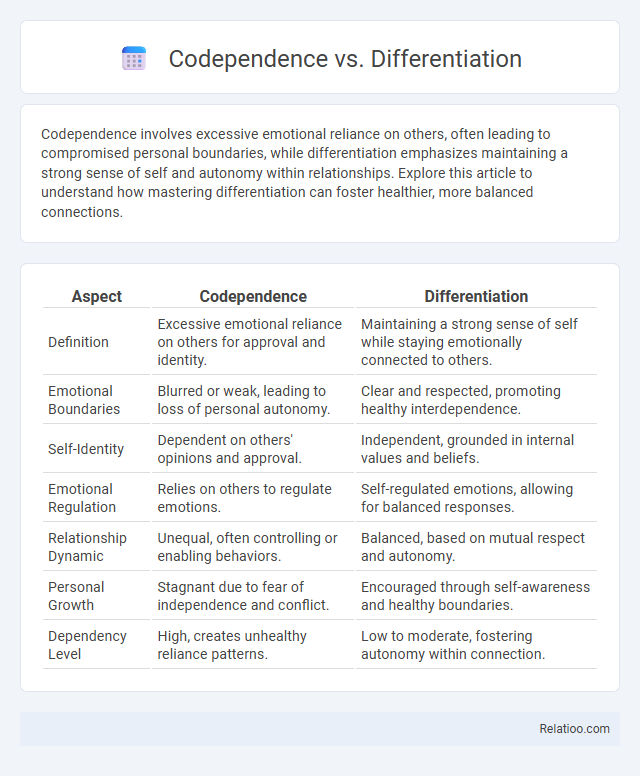Codependence involves excessive emotional reliance on others, often leading to compromised personal boundaries, while differentiation emphasizes maintaining a strong sense of self and autonomy within relationships. Explore this article to understand how mastering differentiation can foster healthier, more balanced connections.
Table of Comparison
| Aspect | Codependence | Differentiation |
|---|---|---|
| Definition | Excessive emotional reliance on others for approval and identity. | Maintaining a strong sense of self while staying emotionally connected to others. |
| Emotional Boundaries | Blurred or weak, leading to loss of personal autonomy. | Clear and respected, promoting healthy interdependence. |
| Self-Identity | Dependent on others' opinions and approval. | Independent, grounded in internal values and beliefs. |
| Emotional Regulation | Relies on others to regulate emotions. | Self-regulated emotions, allowing for balanced responses. |
| Relationship Dynamic | Unequal, often controlling or enabling behaviors. | Balanced, based on mutual respect and autonomy. |
| Personal Growth | Stagnant due to fear of independence and conflict. | Encouraged through self-awareness and healthy boundaries. |
| Dependency Level | High, creates unhealthy reliance patterns. | Low to moderate, fostering autonomy within connection. |
Introduction to Codependence and Differentiation
Codependence is characterized by an excessive emotional reliance on others, often leading to compromised personal boundaries and self-identity. Differentiation involves maintaining a healthy balance between emotional connection and autonomy, enabling individuals to manage their feelings without losing self-integrity. Understanding the contrast between codependence and differentiation is essential for recognizing patterns of relational health and emotional self-regulation.
Defining Codependence in Relationships
Codependence in relationships is characterized by an excessive emotional reliance on a partner, often leading to unhealthy boundaries and a loss of individual identity. Differentiation involves maintaining your own sense of self while engaging in close relationships, allowing for emotional autonomy and healthy interdependence. Understanding the contrast between codependence and differentiation helps you create balanced connections where both partners support each other's growth without enmeshment.
Understanding Differentiation of Self
Understanding Differentiation of Self involves recognizing one's ability to maintain a clear sense of identity while remaining emotionally connected to others, key in healthy relationships. Codependence reflects a blurred sense of self where personal boundaries are weak, leading to excessive reliance on others' approval or emotions. Differentiation promotes emotional regulation and autonomy, fostering resilience and balanced interpersonal dynamics.
Key Characteristics of Codependent Dynamics
Codependent dynamics are characterized by an excessive emotional reliance on others for validation and self-worth, leading to blurred personal boundaries and a compulsive need to please. Differentiation involves maintaining a strong sense of self while staying emotionally connected, enabling you to balance intimacy and autonomy effectively. Understanding these key traits helps you recognize unhealthy patterns and foster healthier, more independent relationships.
Signs and Traits of Differentiated Individuals
Differentiated individuals exhibit high emotional intelligence, maintaining a strong sense of self while managing close relationships without losing their identity. Signs include clear boundaries, effective communication, and the ability to balance intimacy with autonomy. Your capacity to stay calm under stress and resist emotional fusion highlights healthy differentiation as opposed to codependence.
Emotional Boundaries: Codependence vs Differentiation
Codependence involves blurred emotional boundaries where individuals prioritize others' needs over their own, leading to dependency and loss of self-identity. Differentiation emphasizes maintaining clear emotional boundaries, allowing individuals to balance intimacy with autonomy and manage emotions without being overwhelmed by others. Healthy differentiation fosters self-awareness and resilience, enabling individuals to engage in relationships without sacrificing personal emotional well-being.
Impact on Communication and Conflict Resolution
Codependence often hinders effective communication by fostering dependency and unclear boundaries, leading to unresolved conflicts and emotional turmoil. Differentiation promotes healthier communication by enabling individuals to express their needs and emotions clearly while respecting others' perspectives, thereby facilitating constructive conflict resolution. Understanding these dynamics can empower your interactions, encouraging emotional autonomy and collaborative problem-solving.
Roots and Causes: Family and Cultural Influences
Codependence often stems from family dynamics where emotional needs are unmet, leading individuals to rely excessively on others for validation, while differentiation is rooted in a supportive environment encouraging self-identity and autonomy. Cultural influences also play a critical role, as collectivist societies may foster codependent behaviors by prioritizing group harmony over individual boundaries, whereas individualistic cultures tend to promote differentiation by valuing personal independence. Understanding Your family history and cultural background can reveal the origins of these patterns, guiding healthier emotional development and interpersonal relationships.
Strategies for Shifting from Codependence to Differentiation
Shifting from codependence to differentiation involves establishing clear personal boundaries and fostering emotional autonomy. You can practice self-awareness by recognizing patterns of enmeshment and developing assertive communication skills to express your needs effectively. Prioritizing self-care and seeking supportive therapy or counseling further strengthens your ability to maintain healthy, interdependent relationships.
Benefits of Differentiation for Personal Growth and Healthy Relationships
Differentiation promotes emotional autonomy by helping you manage your own thoughts and feelings without being overwhelmed by others' emotions, fostering personal growth. It enhances communication and conflict resolution skills, leading to healthier, more balanced relationships. Developing differentiation reduces codependent behaviors, allowing for authentic connections and increased emotional resilience.

Infographic: Codependence vs Differentiation
 relatioo.com
relatioo.com